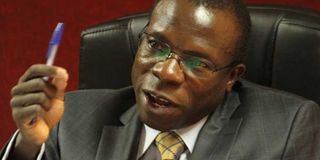Supreme Court erred in gender rule advisory, says Judge George Odunga

Mr Justice George Odunga. The Supreme Court set a dangerous precedent when it set the August 2015 deadline for enactment of a law to effect the two-thirds gender rule, he said on May 15, 2015. FILE PHOTO |
What you need to know:
- Mr Justice George Odunga on Friday said courts ought to only make decisions on matters before them and desist from going out of their way to "fish" for new findings that are not practicable.
- Judge Odunga said the Supreme Court exposed itself to serious ‘trouble’.
- Parliament, he said, has the right to exercise its mandate independently but must be stopped in its tracks when it deviates and denies individuals chances to defend themselves.
The Supreme Court set a dangerous precedent when it set the August 2015 deadline for enactment of a law to effect the two-thirds gender rule, a High Court judge has said.
Mr Justice George Odunga on Friday said courts ought to only make decisions on matters before them and desist from going out of their way to "fish" for new findings that are not practicable.
“The Supreme Court should not give decisions that are for academic reasons only as I fear we are not ready for the August deadline,"he said.
"The Supreme Court tied its hands as the timeline should have been left for another body to decide and if someone ends up in court after say 10 years, then the Supreme Court would have been at liberty to decide as to whether the 10-year period as set is reasonable,” he added.
SERIOUS TROUBLE
Speaking in Nakuru during a legal seminar organised by the Law Society of Kenya’s Continuing Professional Development programme, judge Odunga said the Supreme Court exposed itself to serious ‘trouble’.
“What happens if someone moves to court to seek dissolution of Parliament for failing to meet the August deadline on the strength of the Supreme Court decision? he said.
Parliament, he said, has the right to exercise its mandate independently but must be stopped in its tracks when it deviates and denies individuals chances to defend themselves.
Intellectual Property Tribunal Chairman Moses Kurgat said the top court in the land displayed utter confusion and failed to help the country move forward.
CAUSING CONFUSION
“The Supreme Court should be a bigger beam of light out of a legal quagmire but should desist from causing confusion. In this case, it caused more confusion that is not helping anyone,” he said.
Speakers at the seminar urged judiciary to give give tribunals a chance to serve Kenyan, saying clogging of courts with all manner of disputes denied justice, wasted time and money.
Lawyers also protested that most tribunals lack funds and most appointees lack expertise to handle matters before them, making them a haven for retirees.




